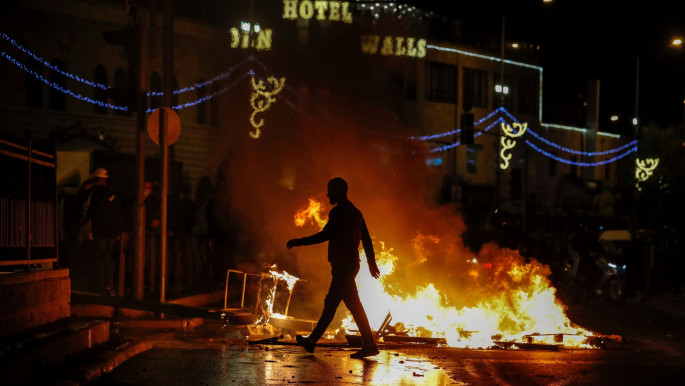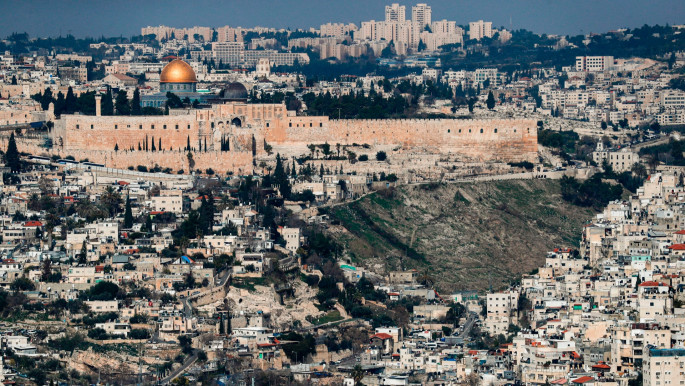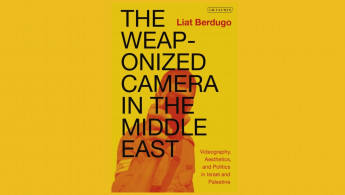Captured on camera: The 'weapon' that exposes Israeli state and settler violence
B'Tselem's Camera Project provides the premise for this book – an initiative which the Israeli NGO undertook in order to allow Palestinians to film Israeli state and settler violations.
Read also: Israel's demographic battle for Jerusalem leaves Palestinians struggling to survive
In the absence of freedom to clamour for rights, the camera empowers Palestinians as it becomes the means of exposing violations and mirroring back to the settler-colonial society what its normalised violence looks like.
The Palestinian act of recording violations is seen in sharp contrast to Israel's use of film technology, notably the surveillance systems and the positioning of settlements on hilltops above Palestinian villages.
Israeli surveillance is a tool oppression; the cameras supplied by B'Tselem, which remain the property of the organisation to facilitate retrieving in case of confiscation by the military, are weaponised in terms of the settler-colonial project and violence.
With no avenue left for Palestinians but to record their daily experiences on film, the camera takes on the metaphor of a weapon as it wields the power to expose violations.
 |
With no avenue left for Palestinians but to record their daily experiences on film, the camera takes on the metaphor of a weapon as it wields the power to expose violations |  |
Berdugo writes, "A visible invisibility would expose ongoing settler-colonial violence, structural forms of racism, ethnopolitical supremacy, and religious dominance of Jewish Israeli actors over an occupied Palestinian population."
Each chapter details specific circumstance of B'Tselem's filming. The camera's exposure of state and settler violence is one main derivative of the project, and one that remains prevalent throughout the study.
 |
|
| Read also: What if they'd been shouting, "Death to the Jews!"? |
While cameras can sometimes act as a deterrent to settler violence, the act of filming itself brings about exposure of individual Israeli settlers or the Israeli Defence Forces (IDF) in a way that can tarnish the image which Israel has crafted to sell to the world.
Democracy and "the most moral army in the world" are incompatible with the liaison of state and settler actors when it comes to oppressing Palestinians. The soldier who acts in an immoral manner and is recorded on camera "weakens the force of the IDF's collective power," the author states.
On the Israeli side, the settler society has yet to collectively come to terms with its violent foundations and acts. Berdugo refers to the 2014 footage of settlers in Sderot enjoying the sight of the Israeli aerial aggression over Gaza.
Looking, the author states, is "a form of power." The Israeli use of film, such as in the case of Eden Abergil, an Israeli soldier who posed with blindfolded Palestinian detainees, can be tied to shame just as much as B'Tselem's footage of soldiers harassing Palestinians at checkpoints is a shameful act.
However, the author notes, shame in Israeli society is related to exposure rather than the immoral and violent acts committed by members of its society.
 |
Shame in Israeli society is related to exposure rather than the immoral and violent acts committed by members of its society. |  |
Similar to B'Tselem's exposure is the NGO's Breaking The Silence project, in which IDF veterans narrate their experiences, including that of viewing footage of their own atrocities, in a manner of reckoning and dissemination within Israeli society. Berdugo writes, "the search for responsibility and accountability seeks a displaced vessel of blame outside itself."
 |
|
| Read also: Battle for Silwan: The Palestinian family fighting Israeli eviction in Jerusalem |
In Israel, the blame for footage is not placed upon the actors responsible for the violence, but rather on the person filming.
Which is why, the author notes, Israeli settlers and IDF members seeks to obstruct filming, both through confiscation of footage which has happened to B'Tselem on many occasions during raids, or by obstructing vision during filming.
B'Tselem's camera footage provides a glimpse into Palestinian realities which is usually the work of foreign videographers and photographers. The difference is that citizen participation enables the viewer to share the Palestinian perspective directly, rather than observing the work of an external videographer.
 |
In Israel, the blame for footage is not placed upon the actors responsible for the violence, but rather on the person filming |  |
With the increased participation in B'Tselem's project, Israel has become more conscious of the need to maintain the image it has projected.
As early as 2002, the IDF had already voiced concerns over media portrayal of its violations, noting that "Israeli military operations [should] be carried out in an unphotographable manner." The advice is clear – it is not for the IDF to refrain from committing violations, but to make sure that such violations remained concealed.
From the Israeli perspective, the camera is a means of incitement. B'Tselem was also given the same attribute by Avigdor Lieberman in 2011 and lately the organisation has been the Israeli government's target once again after its executive director Hagai el-Ad, declared Israel an apartheid state.
B'Tselem has shifted its position throughout the years, in its realisation that the project it started with the aim of exposing Israeli violations was being exploited by Israel, making the organisation seem tacitly complicit in the oppression of Palestinians.
Berdugo writes, "By ceasing cooperation with the game of the Israeli legal system, B'Tselem has demanded to make the frame visible and to obliterate it."
 |
The weaponised camera is the less damaging alternative for a Palestinian choosing between visibility and violence |  |
Berdugo's study is written in an engaging and accessible manner, with each chapter building upon the previous to a conclusion that draws attention to the book's original premise.
While the Israeli point of view dehumanises the Palestinian captured on camera, B'Tselem's project allowed Palestinians to counter violence and dehumanisation with aesthetics and assertion, as the author states, "The weaponised camera is the less damaging alternative for a Palestinian choosing between visibility and violence."
Ramona Wadi is an independent researcher, freelance journalist, book reviewer and blogger specialising in the struggle for memory in Chile and Palestine, colonial violence and the manipulation of international law.
Follow her on Twitter here: @walzerscent



